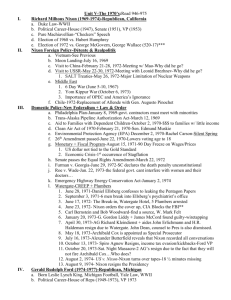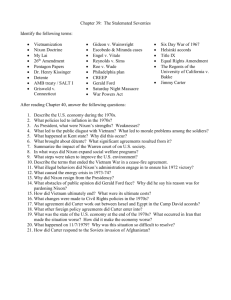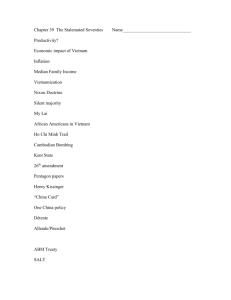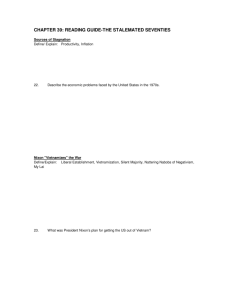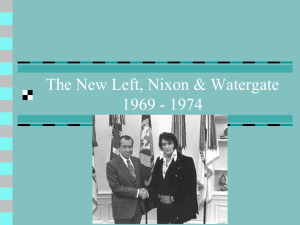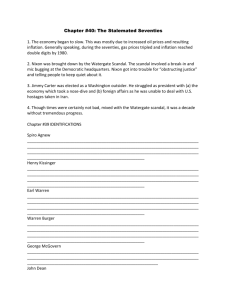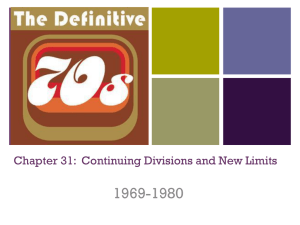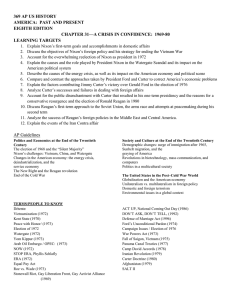Chapter 39 Notes - Twinsburg Schools
advertisement
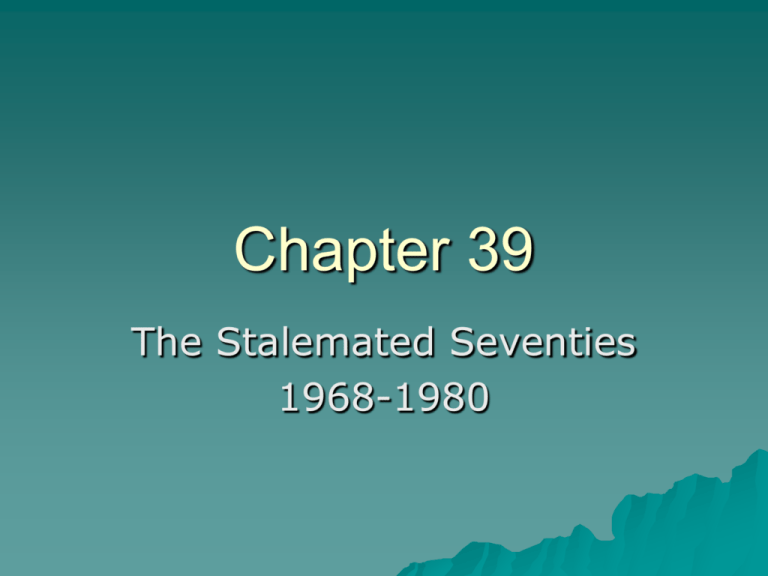
Chapter 39 The Stalemated Seventies 1968-1980 Stagflation Stagflation economy (stagnant economy and inflation) Nixon attempted tax increases and budget cuts – Deficit spending – Japan and West Germany= industrial producers outpacing US – Larger labor market, less jobs – Embargo on oil by OPEC – Shifting to post industrial economy Nixon took US off gold standard Vietnamization Vietnamization= Nixon’s plan for war “peace with honor” Support from the Silent Majority My Lai massacre= outraged public at horrors and cover-up April 30, 1970: bombing raids and invasion into Cambodia= riots at colleges – Kent State May 4, 1970 – Jackson State University May 14, 1970 Vietnamization Congress responded to escalation by repealing the Tonkin Gulf Resolution The Pentagon Papers leaked to media June 1971 26th amendment passed 1971 Détente Henry Kissinger= policy of realpolitik Realistically, can’t deny mainland China! Promoted a policy of détente 1972: Nixon “opened China” Met with Leonid Brezhnev in USSR in 1972 SALT I Treaty and ABM treaty to ease Cold War tensions Reaction to Warren Court Liberal Warren Court= judicial activism – Griswold vs. Connecticut 1965 – NY Times vs. Sullivan 1964 – Baker vs. Carr 1962 – Limits on religion in schools, rights for accused expanded (Miranda Warning) Reaction by Nixon (conservative)= 4 new justices Burger Court (Roe vs. Wade!) Environmentalism Silent Spring by Rachel Carson 1962= ban on DDT Environmental Protection Agency 1970 Clean Air Act 1970 Endangered Species Act 1973 1972 Election Democrats= George McGovern (withdrawal from Vietnam within 90 days) Republicans= Richard Nixon Southern Strategy At Paris Peace Conference days before election, Kissinger= “peace is at hand” Watergate Balance of power skewed toward president The President’s Men- win at any cost June 17, 1972 break in at Democratic headquarters at Watergate complex – Plumbers – Committee to Reelect the President (CREEP) Bob Woodward and Carl Bernstein Testimony to Congress= release the tapes! Watergate Saturday Night Massacre- Special Prosecutor Cox ordered tapes VP Spiro Agnew resigned (bribes as governor of Maryland) 25th amendment= Gerald Ford confirmed as new Vice President War Powers Act 1973: bombing raids on Cambodia! Khmer Rouge and Pol Pot after Cambodian Civil War War Powers Act November 1973 Watergate President’s Men= indicted March 1974 Nixon= tapes are executive privilege! Supreme Court ordered release of tapes implicated president in break in and cover up by FBI August 8, 1974: Nixon resigned Gerald Ford assumed presidency (appointed) – Nixon pardoned by Ford End to Vietnam War between North and South Vietnam continued to 1975 Military aid to South Vietnam ended as North advanced on Saigon Evacuation April 29, 1975 Lasting effects: 58,000 KIA, 365,000 wounded, “baby killers”, PTSD, suicide for veterans The Last Days of Saigon Violence often attended the frantic American evacuation from Vietnam in 1975. 2nd Feminism wave Feminism= Betty Friedan (NOW) and Gloria Steinem (Ms. Magazine) Title IX 1972 Equal Rights Amendment (ERA) 1972 stalled by conservatives (Phyllis Shlafly) Supreme Court challenged sex discrimination in legislation and employment Roe vs. Wade 1973 Conservative backlash against feminism A multiethnic and multiracial group of women, accompanied by noted “second-wave” feminists Bella Abzug (in hat) and Betty Friedan (far right), helped to carry a torch from Seneca Falls, New York, birthplace of the feminist movement, to Houston, Texas, site of the National Women’s Conference. Antifeminist Phyllis Schlafly (b. 1924) Schlafly traveled the country promoting her “STOP ERA” campaign. She argued that ratification of the Equal Rights Amendment would undermine the American family by violating “the right of a wife to be supported by her husband,” requiring women to serve in combat, and legalizing homosexual marriage. Minorities Busing to end de facto segregation limited by Milliken vs. Bradley 1974 Regents of University of California vs. Bakke 1978 Affirmative Action American Indian Movement (AIM)civil disobedience and media to promote message – Standoff at Wounded Knee, seizure of Alcatraz and Bureau of Indian Affairs Jimmy Carter 1976 Election: Ford (Republican) vs. Carter (Democrat) Washington outsider Camp David Accords 1978 between Egypt and Israel Carter presidency= rising inflation (13% by 1979), oil prices, interest rates, deficits= economic problems Celebrating the Camp David Agreement, September 1978 Anwar Sadat of Egypt (left) and Menachem Begin of Israel (right) join U.S. president Jimmy Carter in confirming the historic accord that brought the hope of peace to the war-torn Middle East. Jimmy Carter 1979: Ayatollah Khomeini in Iran (anti-US) Iranian oil shut down, OPEC ↑ prices Carter= Malaise speech SALT II treaty with Brezhnev in 1979 not ratified because of Afghanistan invasion Americans at embassy in Teheran taken hostage November 1979 for 444 days Two-Way SALT Talks The grim specter of nuclear holocaust haunted the SALT II talks between President Carter and Soviet leader Leonid Brezhnev in Vienna in June 1979. Iranians Denounce President Jimmy Carter, November 1979 Scenes like this one appeared almost nightly on American television during the 444 days of the Iranian hostage crisis, humiliating Carter and angering American citizens.

